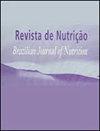妊娠期糖尿病孕妇水果食用时间对血糖调节的影响
IF 0.5
4区 医学
Q4 NUTRITION & DIETETICS
Revista De Nutricao-brazilian Journal of Nutrition
Pub Date : 2023-01-01
DOI:10.1590/1678-9865202336e220238
引用次数: 0
摘要
【摘要】目的探讨水果食用时间对妊娠期糖尿病孕妇血糖调节的影响。方法对64名诊断为妊娠期糖尿病的志愿者进行研究。被引导到营养与饮食学系的参与者根据申请的顺序分为两组;第一组被纳入营养治疗计划一周,以水果作为正餐,第二组吃零食。在这个过程中,参与者被应用了一个个性化的营养计划,该计划对所有含有等热量3主食和4零食的膳食的宏量营养素进行了平等的调整。在此过程中,参与者每天测量6次血糖值,并比较两组在开始营养治疗前和开始医学营养治疗后第7天的血糖结果。结果第一组和第二组参加研究的女性平均年龄分别为33.50±4.95岁和32.28±5.18岁,两组的人体测量值相近。各组晨间餐后血糖平均水平从组1的180mg/d降至115mg/dL (p< 001),组2从185mg/dL降至110mg/dL (p< 001)。各组药物营养治疗前后的早、中、晚空腹血糖及餐后血糖水平均有降低,但组间差异无统计学意义(p>0.05)。所有参加妊娠糖尿病饮食的参与者都有正常的血糖水平,不需要胰岛素。在研究的第七天,以水果作为零食的孕妇组(第二组)的餐后血糖和空腹血糖的差异水平有统计学意义的降低(p< 001)。两组饮食前和饮食后空腹血糖值差异无统计学意义(p> 0.05)。结论本研究发现,药物营养治疗对妊娠期糖尿病孕妇的血糖水平有降低作用,但将水果作为零食或在正餐中食用对空腹血糖和餐后血糖没有显著影响。结论:妊娠期糖尿病患者每日摄入碳水化合物的种类和数量对血糖水平有决定性影响。本文章由计算机程序翻译,如有差异,请以英文原文为准。
The effect of fruit consumption time on glucose regulation in pregnancy with gestational diabetes
ABSTRACT Objective This study aims to determine the effect of fruit consumption time on blood glucose regulation in pregnant women with gestational diabetes. Methods The study was carried out with 64 volunteer participants diagnosed with gestational diabetes. Participants who were directed to the Department of Nutrition and Dietetics were divided into two groups according to the order of application; Group 1 was included in the nutrition treatment program for a week, consuming fruit for the main meal and Group 2 for the snack. During this process, the participants were applied a personalized nutrition plan that was adjusted equally for macronutrients of all meals containing isocaloric 3 main and 4 snacks. In this process, blood glucose values were measured six times a day by the participants and the blood glucose results of both groups before starting the nutrition therapy and on the seventh day after starting the medical nutrition therapy were compared. Results The mean age of the women participating in the study was 33.50±4.95 years and 32.28±5.18 years for the 1st and 2nd groups, respectively, and the groups were similar in terms of anthropometric measurements. The post-diet average of postprandial blood glucose levels in the morning within each group dropped from 180mg/d to 115mg/dL (p<0,001) for Group 1 and from 185mg/dL to 110mg/dL (p<0,001) for Group 2. There was a decrease in the fasting plasma glucose and postprandial blood glucose levels measured in the morning, noon and evening before and after the medical nutrition therapy of the groups, but no statistically significant difference was found between the groups (p>0.05). All participants on the gestational diabetes diet had normal blood sugar levels without the need for insulin. A statistically significant decrease was observed in the postprandial blood glucose-fasting plasma glucose difference levels of the pregnant women in the group that consumed fruit for snacks (Group 2) on the seventh day of the study (p<0,001). There was no significant difference in the pre-diet and post-diet morning fasting plasma glucose values of both groups (p>0,05). Conclusion This study found that medical nutrition therapy in pregnant women with gestational diabetes led to a decrease in blood glucose levels, but consuming fruits as a snack or at the main meal did not make a significant difference on fasting plasma glucose and postprandial blood glucose. It was concluded that the type and amount of carbohydrates consumed daily in gestational diabetes are determinative on blood glucose level.
求助全文
通过发布文献求助,成功后即可免费获取论文全文。
去求助
来源期刊
CiteScore
1.20
自引率
12.50%
发文量
24
审稿时长
6-12 weeks
期刊介绍:
Revista de Nutrição is former Revista de Nutrição da Puccamp, founded in 1988. It is a bimonthly publication every four months and it is of responsibility of the Centro de Ciências da Vida, da Pontifícia Universidade Católica de Campinas . It publishes articles that contribute to the study of Nutrition in its many sub-areas and interfaces; and is open to contributions of the national and international scientific communities.

 求助内容:
求助内容: 应助结果提醒方式:
应助结果提醒方式:


